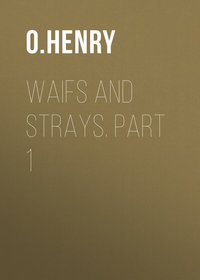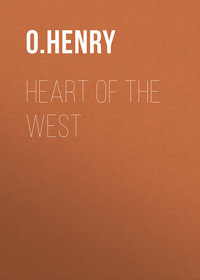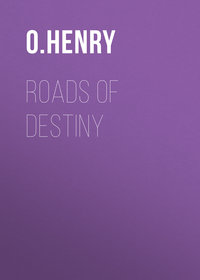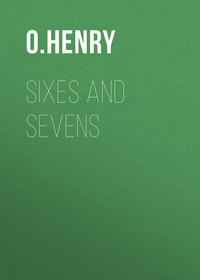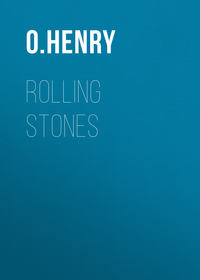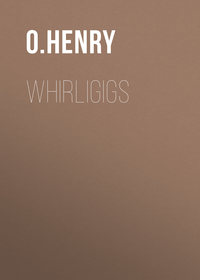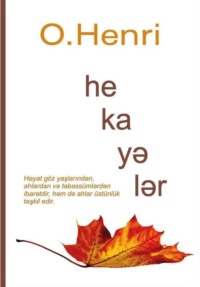![Heart of the West [Annotated]](/covers_330/25561004.jpg) полная версия
полная версияHeart of the West [Annotated]
I murmured a few words of sympathy. But it was uncomprehending, for I did not know his grievance against the rulers who flash, meteor-like, now and then upon our shores.
"The last one I sold," continued the displeased one, "was to that three-horse-tailed Turkish pasha that came over a year ago. Five hundred dollars he paid for it, easy. I says to his executioner or secretary – he was a kind of a Jew or a Chinaman – 'His Turkey Giblets is fond of horses, then?'
"'Him?' says the secretary. 'Well, no. He's got a big, fat wife in the harem named Bad Dora that he don't like. I believe he intends to saddle her up and ride her up and down the board-walk in the Bulbul Gardens a few times every day. You haven't got a pair of extra-long spurs you could throw in on the deal, have you?' Yes, sir; there's mighty few real rough-riders among the royal sports these days."
As soon as Lucullus Polk got cool enough I picked him up, and with no greater effort than you would employ in persuading a drowning man to clutch a straw, I inveigled him into accompanying me to a cool corner in a dim café.
And it came to pass that man-servants set before us brewage; and Lucullus Polk spake unto me, relating the wherefores of his beleaguering the antechambers of the princes of the earth.
"Did you ever hear of the S.A. & A.P. Railroad23 in Texas? Well, that don't stand for Samaritan Actor's Aid Philanthropy. I was down that way managing a summer bunch of the gum and syntax-chewers that play the Idlewild Parks in the Western hamlets. Of course, we went to pieces when the soubrette ran away with a prominent barber of Beeville. I don't know what became of the rest of the company. I believe there were some salaries due; and the last I saw of the troupe was when I told them that forty-three cents was all the treasury contained. I say I never saw any of them after that; but I heard them for about twenty minutes. I didn't have time to look back. But after dark I came out of the woods and struck the S.A. & A.P. agent for means of transportation. He at once extended to me the courtesies of the entire railroad, kindly warning me, however, not to get aboard any of the rolling stock.
"About ten the next morning I steps off the ties into a village that calls itself Atascosa City. I bought a thirty-cent breakfast and a ten-cent cigar, and stood on the Main Street jingling the three pennies in my pocket – dead broke. A man in Texas with only three cents in his pocket is no better off than a man that has no money and owes two cents.
"One of luck's favourite tricks is to soak a man for his last dollar so quick that he don't have time to look it. There I was in a swell St. Louis tailor-made, blue-and-green plaid suit, and an eighteen-carat sulphate-of-copper scarf-pin, with no hope in sight except the two great Texas industries, the cotton fields and grading new railroads. I never picked cotton, and I never cottoned to a pick, so the outlook had ultramarine edges.
"All of a sudden, while I was standing on the edge of the wooden sidewalk, down out of the sky falls two fine gold watches in the middle of the street. One hits a chunk of mud and sticks. The other falls hard and flies open, making a fine drizzle of little springs and screws and wheels. I looks up for a balloon or an airship; but not seeing any, I steps off the sidewalk to investigate.
"But I hear a couple of yells and see two men running up the street in leather overalls and high-heeled boots and cartwheel hats. One man is six or eight feet high, with open-plumbed joints and a heartbroken cast of countenance. He picks up the watch that has stuck in the mud. The other man, who is little, with pink hair and white eyes, goes for the empty case, and says, 'I win.' Then the elevated pessimist goes down under his leather leg-holsters and hands a handful of twenty-dollar gold pieces to his albino friend. I don't know how much money it was; it looked as big as an earthquake-relief fund to me.
"'I'll have this here case filled up with works,' says Shorty, 'and throw you again for five hundred.'
"'I'm your company,' says the high man. 'I'll meet you at the Smoked Dog Saloon an hour from now.'
"The little man hustles away with a kind of Swiss movement toward a jewelry store. The heartbroken person stoops over and takes a telescopic view of my haberdashery.
"'Them's a mighty slick outfit of habiliments you have got on, Mr. Man,' says he. 'I'll bet a hoss you never acquired the right, title, and interest in and to them clothes in Atascosa City.'
"'Why, no,' says I, being ready enough to exchange personalities with this moneyed monument of melancholy. 'I had this suit tailored from a special line of coatericks, vestures, and pantings in St. Louis. Would you mind putting me sane,' says I, 'on this watch-throwing contest? I've been used to seeing time-pieces treated with more politeness and esteem – except women's watches, of course, which by nature they abuse by cracking walnuts with 'em and having 'em taken showing in tintype pictures.'
"'Me and George,' he explains, 'are up from the ranch, having a spell of fun. Up to last month we owned four sections of watered grazing down on the San Miguel. But along comes one of these oil prospectors and begins to bore. He strikes a gusher that flows out twenty thousand – or maybe it was twenty million – barrels of oil a day. And me and George gets one hundred and fifty thousand dollars – seventy-five thousand dollars apiece – for the land. So now and then we saddles up and hits the breeze for Atascosa City for a few days of excitement and damage. Here's a little bunch of the dinero that I drawed out of the bank this morning,' says he, and shows a roll of twenties and fifties as big around as a sleeping-car pillow. The yellowbacks glowed like a sunset on the gable end of John D.'s barn. My knees got weak, and I sat down on the edge of the board sidewalk.
"'You must have knocked around a right smart,' goes on this oil Grease-us24. 'I shouldn't be surprised if you have saw towns more livelier than what Atascosa City is. Sometimes it seems to me that there ought to be some more ways of having a good time than there is here, 'specially when you've got plenty of money and don't mind spending it.'
"Then this Mother Cary's chick25 of the desert sits down by me and we hold a conversationfest. It seems that he was money-poor. He'd lived in ranch camps all his life; and he confessed to me that his supreme idea of luxury was to ride into camp, tired out from a round-up, eat a peck of Mexican beans, hobble his brains with a pint of raw whisky, and go to sleep with his boots for a pillow. When this barge-load of unexpected money came to him and his pink but perky partner, George, and they hied themselves to this clump of outhouses called Atascosa City, you know what happened to them. They had money to buy anything they wanted; but they didn't know what to want. Their ideas of spendthriftiness were limited to three – whisky, saddles, and gold watches. If there was anything else in the world to throw away fortunes on, they had never heard about it. So, when they wanted to have a hot time, they'd ride into town and get a city directory and stand in front of the principal saloon and call up the population alphabetically for free drinks. Then they would order three or four new California saddles from the storekeeper, and play crack-loo26 on the sidewalk with twenty-dollar gold pieces. Betting who could throw his gold watch the farthest was an inspiration of George's; but even that was getting to be monotonous.
"Was I on to the opportunity? Listen.
"In thirty minutes I had dashed off a word picture of metropolitan joys that made life in Atascosa City look as dull as a trip to Coney Island with your own wife. In ten minutes more we shook hands on an agreement that I was to act as his guide, interpreter and friend in and to the aforesaid wassail and amenity. And Solomon Mills, which was his name, was to pay all expenses for a month. At the end of that time, if I had made good as director-general of the rowdy life, he was to pay me one thousand dollars. And then, to clinch the bargain, we called the roll of Atascosa City and put all of its citizens except the ladies and minors under the table, except one man named Horace Westervelt St. Clair. Just for that we bought a couple of hatfuls of cheap silver watches and egged him out of town with 'em. We wound up by dragging the harness-maker out of bed and setting him to work on three new saddles; and then we went to sleep across the railroad track at the depot, just to annoy the S.A. & A.P. Think of having seventy-five thousand dollars and trying to avoid the disgrace of dying rich in a town like that!
"The next day George, who was married or something, started back to the ranch. Me and Solly, as I now called him, prepared to shake off our moth balls and wing our way against the arc-lights of the joyous and tuneful East.
"'No way-stops,' says I to Solly, 'except long enough to get you barbered and haberdashed. This is no Texas feet shampetter,' says I, 'where you eat chili-concarne-con-huevos and then holler "Whoopee!" across the plaza. We're now going against the real high life. We're going to mingle with the set that carries a Spitz, wears spats, and hits the ground in high spots.'
"Solly puts six thousand dollars in century bills in one pocket of his brown ducks, and bills of lading for ten thousand dollars on Eastern banks in another. Then I resume diplomatic relations with the S.A. & A.P., and we hike in a northwesterly direction on our circuitous route to the spice gardens of the Yankee Orient.
"We stopped in San Antonio long enough for Solly to buy some clothes, and eight rounds of drinks for the guests and employees of the Menger Hotel27, and order four Mexican saddles with silver trimmings and white Angora suaderos28 to be shipped down to the ranch. From there we made a big jump to St. Louis. We got there in time for dinner; and I put our thumb-prints on the register of the most expensive hotel in the city.
"'Now,' says I to Solly, with a wink at myself, 'here's the first dinner-station we've struck where we can get a real good plate of beans.' And while he was up in his room trying to draw water out of the gas-pipe, I got one finger in the buttonhole of the head waiter's Tuxedo, drew him apart, inserted a two-dollar bill, and closed him up again.
"'Frankoyse,' says I, 'I have a pal here for dinner that's been subsisting for years on cereals and short stogies. You see the chef and order a dinner for us such as you serve to Dave Francis and the general passenger agent of the Iron Mountain when they eat here. We've got more than Bernhardt's tent full of money; and we want the nose-bags crammed with all the Chief Deveries de cuisine. Object is no expense. Now, show us.'
"At six o'clock me and Solly sat down to dinner. Spread! There's nothing been seen like it since the Cambon snack29. It was all served at once. The chef called it dinnay à la poker. It's a famous thing among the gormands of the West. The dinner comes in threes of a kind. There was guinea-fowls, guinea-pigs, and Guinness's stout; roast veal, mock turtle soup, and chicken pâté; shad-roe, caviar, and tapioca; canvas-back duck, canvas-back ham, and cotton-tail rabbit; Philadelphia capon, fried snails, and sloe-gin – and so on, in threes. The idea was that you eat nearly all you can of them, and then the waiter takes away the discard and gives you pears to fill on.
"I was sure Solly would be tickled to death with these hands, after the bobtail flushes he'd been eating on the ranch; and I was a little anxious that he should, for I didn't remember his having honoured my efforts with a smile since we left Atascosa City.
"We were in the main dining-room, and there was a fine-dressed crowd there, all talking loud and enjoyable about the two St. Louis topics, the water supply and the colour line. They mix the two subjects so fast that strangers often think they are discussing water-colours; and that has given the old town something of a rep as an art centre. And over in the corner was a fine brass band playing; and now, thinks I, Solly will become conscious of the spiritual oats of life nourishing and exhilarating his system. But nong, mong frang.
"He gazed across the table at me. There was four square yards of it, looking like the path of a cyclone that has wandered through a stock-yard, a poultry-farm, a vegetable-garden, and an Irish linen mill. Solly gets up and comes around to me.
"'Luke,' says he, 'I'm pretty hungry after our ride. I thought you said they had some beans here. I'm going out and get something I can eat. You can stay and monkey with this artificial layout of grub if you want to.'
"'Wait a minute,' says I.
"I called the waiter, and slapped 'S. Mills' on the back of the check for thirteen dollars and fifty cents.
"'What do you mean,' says I, 'by serving gentlemen with a lot of truck only suitable for deck-hands on a Mississippi steamboat? We're going out to get something decent to eat.'
"I walked up the street with the unhappy plainsman. He saw a saddle-shop open, and some of the sadness faded from his eyes. We went in, and he ordered and paid for two more saddles – one with a solid silver horn and nails and ornaments and a six-inch border of rhinestones and imitation rubies around the flaps. The other one had to have a gold-mounted horn, quadruple-plated stirrups, and the leather inlaid with silver beadwork wherever it would stand it. Eleven hundred dollars the two cost him.
"Then he goes out and heads toward the river, following his nose. In a little side street, where there was no street and no sidewalks and no houses, he finds what he is looking for. We go into a shanty and sit on high stools among stevedores and boatmen, and eat beans with tin spoons. Yes, sir, beans – beans boiled with salt pork.
"'I kind of thought we'd strike some over this way,' says Solly.
"'Delightful,' says I, 'That stylish hotel grub may appeal to some; but for me, give me the husky table d'goat.'
"When we had succumbed to the beans I leads him out of the tarpaulin-steam under a lamp post and pulls out a daily paper with the amusement column folded out.
"'But now, what ho for a merry round of pleasure,' says I. 'Here's one of Hall Caine's shows30, and a stock-yard company in "Hamlet," and skating at the Hollowhorn Rink, and Sarah Bernhardt, and the Shapely Syrens Burlesque Company. I should think, now, that the Shapely – '
"But what does this healthy, wealthy, and wise man do but reach his arms up to the second-story windows and gape noisily.
"'Reckon I'll be going to bed,' says he; 'it's about my time. St. Louis is a kind of quiet place, ain't it?'
"'Oh, yes,' says I; 'ever since the railroads ran in here the town's been practically ruined. And the building-and-loan associations and the fair have about killed it. Guess we might as well go to bed. Wait till you see Chicago, though. Shall we get tickets for the Big Breeze to-morrow?'
"'Mought as well,' says Solly. 'I reckon all these towns are about alike.'
"Well, maybe the wise cicerone31 and personal conductor didn't fall hard in Chicago! Loolooville-on-the-Lake is supposed to have one or two things in it calculated to keep the rural visitor awake after the curfew rings. But not for the grass-fed man of the pampas! I tried him with theatres, rides in automobiles, sails on the lake, champagne suppers, and all those little inventions that hold the simple life in check; but in vain. Solly grew sadder day by day. And I got fearful about my salary, and knew I must play my trump card. So I mentioned New York to him, and informed him that these Western towns were no more than gateways to the great walled city of the whirling dervishes.
"After I bought the tickets I missed Solly. I knew his habits by then; so in a couple of hours I found him in a saddle-shop. They had some new ideas there in the way of trees and girths that had strayed down from the Canadian mounted police; and Solly was so interested that he almost looked reconciled to live. He invested about nine hundred dollars in there.
"At the depot I telegraphed a cigar-store man I knew in New York to meet me at the Twenty-third Street ferry with a list of all the saddle-stores in the city. I wanted to know where to look for Solly when he got lost.
"Now I'll tell you what happened in New York. I says to myself: 'Friend Heherezade, you want to get busy and make Bagdad look pretty to the sad sultan of the sour countenance, or it'll be the bowstring for yours.' But I never had any doubt I could do it.
"I began with him like you'd feed a starving man. I showed him the horse-cars on Broadway and the Staten Island ferry-boats. And then I piled up the sensations on him, but always keeping a lot of warmer ones up my sleeve.
"At the end of the third day he looked like a composite picture of five thousand orphans too late to catch a picnic steamboat, and I was wilting down a collar every two hours wondering how I could please him and whether I was going to get my thou. He went to sleep looking at the Brooklyn Bridge; he disregarded the sky-scrapers above the third story; it took three ushers to wake him up at the liveliest vaudeville in town.
"Once I thought I had him. I nailed a pair of cuffs on him one morning before he was awake; and I dragged him that evening to the palm-cage of one of the biggest hotels in the city – to see the Johnnies and the Alice-sit-by-the-hours. They were out in numerous quantities, with the fat of the land showing in their clothes. While we were looking them over, Solly divested himself of a fearful, rusty kind of laugh – like moving a folding bed with one roller broken. It was his first in two weeks, and it gave me hope.
"'Right you are,' says I. 'They're a funny lot of post-cards, aren't they?'
"'Oh, I wasn't thinking of them dudes and culls on the hoof,' says he. 'I was thinking of the time me and George put sheep-dip in Horsehead Johnson's whisky. I wish I was back in Atascosa City,' says he.
"I felt a cold chill run down my back. 'Me to play and mate in one move,' says I to myself.
"I made Solly promise to stay in the café for half an hour and I hiked out in a cab to Lolabelle Delatour's flat on Forty-third Street. I knew her well. She was a chorus-girl in a Broadway musical comedy.
"'Jane,' says I when I found her, 'I've got a friend from Texas here. He's all right, but – well, he carries weight. I'd like to give him a little whirl after the show this evening – bubbles, you know, and a buzz out to a casino for the whitebait and pickled walnuts. Is it a go?'
"'Can he sing?' asks Lolabelle.
"'You know,' says I, 'that I wouldn't take him away from home unless his notes were good. He's got pots of money – bean-pots full of it.'
"'Bring him around after the second act,' says Lolabelle, 'and I'll examine his credentials and securities.'
"So about ten o'clock that evening I led Solly to Miss Delatour's dressing-room, and her maid let us in. In ten minutes in comes Lolabelle, fresh from the stage, looking stunning in the costume she wears when she steps from the ranks of the lady grenadiers and says to the king, 'Welcome to our May-day revels.' And you can bet it wasn't the way she spoke the lines that got her the part.
"As soon as Solly saw her he got up and walked straight out through the stage entrance into the street. I followed him. Lolabelle wasn't paying my salary. I wondered whether anybody was.
"'Luke,' says Solly, outside, 'that was an awful mistake. We must have got into the lady's private room. I hope I'm gentleman enough to do anything possible in the way of apologies. Do you reckon she'd ever forgive us?'
"'She may forget it,' says I. 'Of course it was a mistake. Let's go find some beans.'
"That's the way it went. But pretty soon afterward Solly failed to show up at dinner-time for several days. I cornered him. He confessed that he had found a restaurant on Third Avenue where they cooked beans in Texas style. I made him take me there. The minute I set foot inside the door I threw up my hands.
"There was a young woman at the desk, and Solly introduced me to her. And then we sat down and had beans.
"Yes, sir, sitting at the desk was the kind of a young woman that can catch any man in the world as easy as lifting a finger. There's a way of doing it. She knew. I saw her working it. She was healthy-looking and plain dressed. She had her hair drawn back from her forehead and face – no curls or frizzes; that's the way she looked. Now I'll tell you the way they work the game; it's simple. When she wants a man, she manages it so that every time he looks at her he finds her looking at him. That's all.
"The next evening Solly was to go to Coney Island with me at seven. At eight o'clock he hadn't showed up. I went out and found a cab. I felt sure there was something wrong.
"'Drive to the Back Home Restaurant on Third Avenue,' says I. 'And if I don't find what I want there, take in these saddle-shops.' I handed him the list.
"'Boss,' says the cabby, 'I et a steak in that restaurant once. If you're real hungry, I advise you to try the saddle-shops first.'
"'I'm a detective,' says I, 'and I don't eat. Hurry up!'
"As soon as I got to the restaurant I felt in the lines of my palms that I should beware of a tall, red, damfool man, and I was going to lose a sum of money.
"Solly wasn't there. Neither was the smooth-haired lady.
"I waited; and in an hour they came in a cab and got out, hand in hand. I asked Solly to step around the corner for a few words. He was grinning clear across his face; but I had not administered the grin.
"'She's the greatest that ever sniffed the breeze,' says he.
"'Congrats,' says I. 'I'd like to have my thousand now, if you please.'
"'Well, Luke,' says he, 'I don't know that I've had such a skyhoodlin' fine time under your tutelage and dispensation. But I'll do the best I can for you – I'll do the best I can,' he repeats. 'Me and Miss Skinner was married an hour ago. We're leaving for Texas in the morning.'
"'Great!' says I. 'Consider yourself covered with rice and Congress gaiters. But don't let's tie so many satin bows on our business relations that we lose sight of 'em. How about my honorarium?'
"'Missis Mills,' says he, 'has taken possession of my money and papers except six bits. I told her what I'd agreed to give you; but she says it's an irreligious and illegal contract, and she won't pay a cent of it. But I ain't going to see you treated unfair,' says he. 'I've got eighty-seven saddles on the ranch what I've bought on this trip; and when I get back I'm going to pick out the best six in the lot and send 'em to you.'"
"And did he?" I asked, when Lucullus ceased talking.
"He did. And they are fit for kings to ride on. The six he sent me must have cost him three thousand dollars. But where is the market for 'em? Who would buy one except one of these rajahs and princes of Asia and Africa? I've got 'em all on the list. I know every tan royal dub and smoked princerino from Mindanao to the Caspian Sea."
"It's a long time between customers," I ventured.
"They're coming faster," said Polk. "Nowadays, when one of the murdering mutts gets civilised enough to abolish suttee32 and quit using his whiskers for a napkin, he calls himself the Roosevelt of the East, and comes over to investigate our Chautauquas and cocktails. I'll place 'em all yet. Now look here."
From an inside pocket he drew a tightly folded newspaper with much-worn edges, and indicated a paragraph.
"Read that," said the saddler to royalty. The paragraph ran thus:
His Highness Seyyid Feysal bin Turkee, Imam of Muskat, is one of the most progressive and enlightened rulers of the Old World. His stables contain more than a thousand horses of the purest Persian breeds. It is said that this powerful prince contemplates a visit to the United States at an early date.
"There!" said Mr. Polk triumphantly. "My best saddle is as good as sold – the one with turquoises set in the rim of the cantle. Have you three dollars that you could loan me for a short time?"
It happened that I had; and I did.
If this should meet the eye of the Imam of Muskat, may it quicken his whim to visit the land of the free! Otherwise I fear that I shall be longer than a short time separated from my dollars three.
VII
HYGEIA AT THE SOLITO


